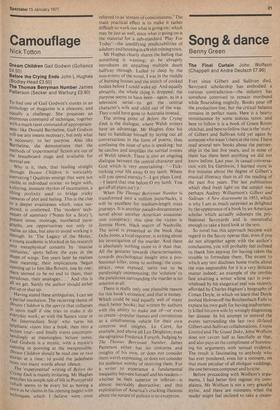Camouflage
Dream Children Gail Godwin (Gollancz £4.50) Before the Crying Ends John L Hughes (Bodley Head £3.50) The Thomas Berryman Number James Patterson (Secker and Warburg £3.90) Nick Totton
To find one of Gail Godwin's stories in an anthology or magazine is a pleasure, and equally a challenge. She possesses an enormous command of technique, together With a much rarer command of appropriateness: like Donald Barthelme, Gail Godwin will use any means necessary, but only what IS necessary, to her purpose. Also like Barthelme, she demonstrates that the methods of 'experimental' fiction are out of the breadboard stage and available for normal use.
Why is it, then, that reading straight through Dream Children is noticeably enervating ? Qualities emerge that were not visible in individual stories: to begin with, a cloying, insistent rhythm of incantation, a lilting prolixity used to bridge tricky caesuras of plot and feeling. This is the clue to a deeper evasiveness which, once suspected, is confirmed. The 'modern' techniques of summary (`Notes for a Story'), Present tense, montage, numbered paragraphs, are opportunities not only to realise an idea, but also to avoid working it through. In 'The Legacy of the Motes,' Young academic is blocked in his research Into metaphysical conceits by `rriuscae volitantes, spots before the eyes in the Shape of wings. Ten years later he realises their meaning; their implications 'began oPening up to him like flowers, one by one; there seemed to be no end to them, their Paradoxes, their analogies. . .' And this is all we get. Surely the author should either Put up or shut up.
Having stated these ambiguities, I can see a Partial resolution. The recurring theme of .brectin Children is the apercu that collapses Ill upon itself if one tries to make it do everyday work; as with the Sussex vicar in An Intermediate Stop' who turns his ePiPhanic vision into a book, then into a lecture tour—and finally stares uncomprehendingly at meaningless lecture notes. Gail Godwin is a mystic, with a mystic's cunning in pointing at the inexpressible. bream Children should be read one or two stories at a time: to avoid the jadedness from too many words about silence. The 'experimental' writing of Before the CrYing Ends is mainly irritating. Mr Hughes Prettifies his simple tale of life in Pontypridd (which seems to be every bit as boring a town as he claims in his opening pages) with techniques which I believe were once referred to as stream of consciousness.' The main practical effect is to make it rather difficult to work out what is going on; which may be just as well, since what is going on is the material for a sub-standard 'Play For Today'—the unedifying predictabilities of adultery and boozing in aWelsh mining town.
Mr Hughes clearly shares the feeling that something is wanting; so he abruptly introduces an appalling multiple death halfway through. Lulled to sleep by the non-events of the novel, I was in the middle of burning houses and the stench of cooked bodies before I could wake up. And equally abruptly, the whole thing is dropped; the purpose seems to have been—again, as in a 'television serial—to get the central character's wife and child out of the way. They could have gone to Australia instead,
The strong point of Before the Crying Ends is the dialogue, where Welsh writers have an advantage. Mr Hughes does his best to handicap himself by laying out all conversations in the form of poems, thus confusing the issue of who is speaking; but he catches and amplifies the surreal ironies of Welsh speech. There is also an ongoing dialogue between the central character and God which is very entertaining: '—Ticktocking your life away 0 my lamb. Where will you spend eternity ?-1 got plans Lord. —I heard that one before 0 my lamb. You got eff all plans isn't it.'
When The Thomas Berryman Number is transformed into a million paperbacks, it will be excellent for medium-length train journeys. It is another pseudo-documentary novel about another American assassination conspiracy; this time the victim' is Jimmie Horn, black mayor of Nashville. The novel is presented as the book that Ochs Jones, a local reporter, is writing about his investigation of the murder. And there is absolutely nothing more to it than that. All the gestures towards characterisation, towards psychological insight into a professional killer, come to nothing; the conspiracy, once exposed, turns Out to be paralysingly uninteresting; the 'solution' to the paradoxes surrounding the murder is no solution at all.
There is really only one plausible reason for this book's existence, and that is money. Which could be said equally well of many much better books; but written by authors with the ability to make use of—or even to create—popular themes and conventions as a simultaneous vehicle for their own concerns and insights. Le Carre, for example, and above all Len Deighton; even the egregious Frederick Forsyth. Judging by The Thomas Berryman Number, James Patterson either has no concerns and insights of his own, or does not consider them worth expressing, or does not consider his audience worthy of receiving them. For a writer to experience a fundamental inequality between himself and his readers— whether he feels superior or inferior—is almost inevitably destructive; and this exploitation of America's cracking illusions about the nat tire'of politics is no exception.


































 Previous page
Previous page